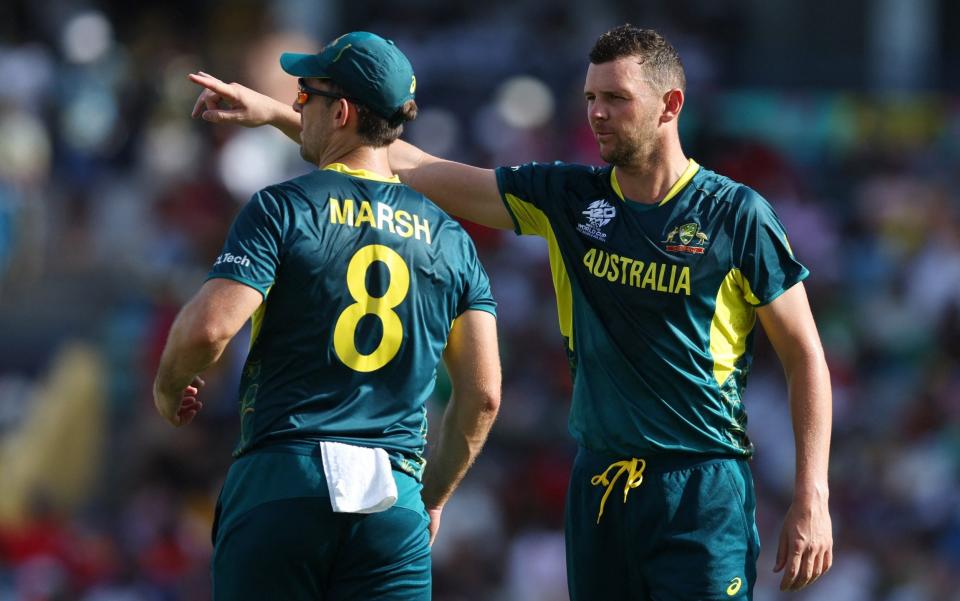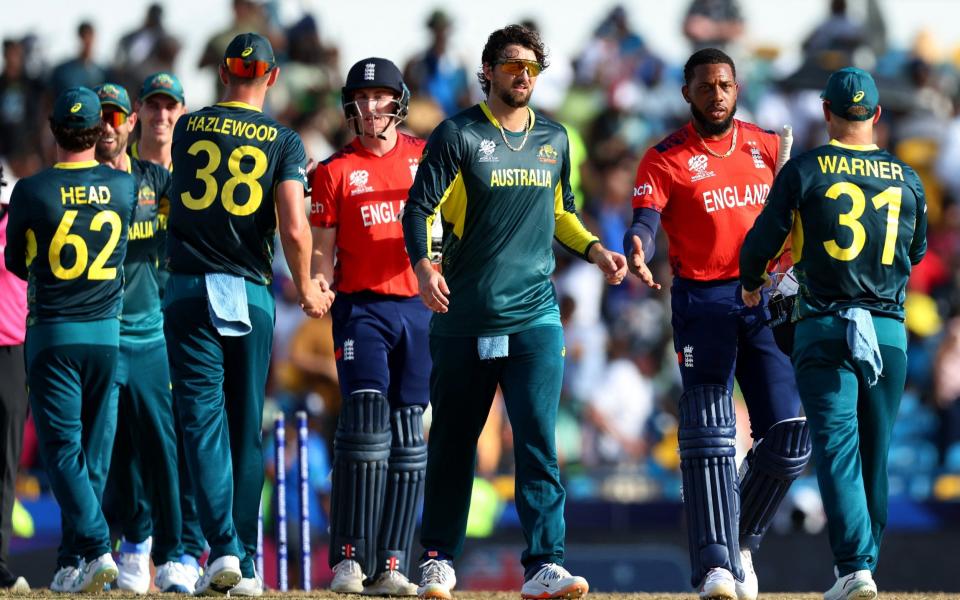Sanctions loom if Australia found to engineer England’s World Cup exit against Scotland

Australia captain Mitchell Marsh will face a ban if his team are found guilty of manipulating their result against Scotland to knock Ashes rivals England out of the T20 World Cup.
Marsh could be hit with a level two charge under the International Cricket Council’s code of conduct – not its anti-corruption code – if the match referee believes his team deliberately concocted a result in winning against or losing to Scotland on Saturday in order to eliminate England on run rate.
After Australia confirmed their place in the Super Eights with a big win over Namibia on Tuesday evening, their fast bowler Josh Hazlewood spiced up the old rivalry by saying it would be in his team’s “best interest” to game the system so England do not progress to the Super Eights because they could be title rivals later on in the tournament.
“In this tournament you potentially come up against England at some stage again and they’re probably one of the top few teams on their day,” said Hazlewood. “We’ve had some real struggles against them in T20 cricket so if we can get them out of the tournament that’s in our best interest as well as probably everyone else.
“But yeah, it’ll be interesting to see. It’s a weird thing to say. We’ve never really been in this position before as a team. I don’t think so. Whether we have discussions or not or we just try and play it again the way we did tonight. Again, that’ll be up to people [the management], not me.”
Hazlewood happily took the opportunity to wind up England – who have to win both their group games against Oman and Namibia to have any hope of rescuing an ailing campaign – and those present felt he was being serious, although signalling their intentions publicly could backfire because it has put focus on how they perform.
England’s Australian coach, Matthew Mott, knows Hazelwood well and described him as a “good bloke” who was probably talking “tongue in cheek” but he might not be so accommodating on Saturday evening if Australia and Scotland cook up a result that knocks his team out and probably costs him his job.
This scenario could play out because England’s final group game against Namibia finishes before Australia and Scotland play in St Lucia on Saturday evening. It is an offence under 2.1.1 of the ICC code of conduct for a team to make ‘any attempt to manipulate an international match for inappropriate strategic or tactical reasons such as when a team deliberately loses a pool match in an ICC event in order to affect the standings of other teams.’
It is punishable by the captain receiving a fine of 50-100 per cent of his match fee and one or two suspension points (one suspension point equals a one match ban) that take immediate effect, possibly ruling Marsh out of a Super Eights game.
Australia coach, Andrew McDonald, was asked the same question before his team’s game against Namibia and sidestepped the scenario but Hazelwood happily obliged.
It fans the flames between England and Australia just months after the stumping controversy at Lord’s, which was reopened recently by the release of the behind the scenes documentary The Test. There was also niggle in the England-Australia game at Barbados last weekend with Matthew Wade receiving an official reprimand after arguing with the umpires over a dead ball.
Mott carefully avoided any attempt to put pressure on the match referee on Saturday evening, Jeff Crowe, and also did not want to be drawn into England-Australia verbals. “I actually don’t think it is ever going to play out. Having grown up in Australia and the will to win every game I am sure they will come to the fore,” he said. England supporters might have wanted to hear something more robust, but Mott is not one for making big statements.

Australia hammered Namibia by nine wickets, bundling them out for 72 and knocking off their target in 5.4 overs. They have not lost to an associate since 1983 and usually kill them off clinically and professionally at ICC events. It would be unlike Australia to slip up or struggle and after Hazlewood’s comments all eyes will be on their performance.
It will all be immaterial if England fail to beat Oman on Thursday night at the Sir Vivian Richards Stadium or lose to Namibia on Saturday afternoon and Jos Buttler warned his team earlier this week not to look too far ahead to the run rate calculations and forget to win the games in front of them.
England must win both matches to go level on five points with Scotland but also overhaul their net run rate. It is hard to predict what they will need to achieve but roughly they have to turn around a 120 run deficit over the course of those two games and hope Scotland’s run rate takes a pounding by Australia.
“Regardless of any outside noise, qualification, run-rates ... essentially we’ve got to win this game,” said Mott. “We’ve spoken really well about that, Jos spoke really well about needing to earn the right to push hard in this game. I think that’s what teams do, nice, cool calculated response. It’s going to be a good wicket here by the looks of it. We go in with a lot of confidence. We’ve played good T20 cricket for a while now, it didn’t quite come off against Australia last time. I think we’ve got our structure in place.”
Reece Topley had a long bowl in training on Wednesday and should come in for either Chris Jordan or Mark Wood. Jordan’s six hitting capability at No.8 is less relevant against the associates - or at least should be less relevant - who might find handling Wood’s pace harder. But Jordan is a superb fielder in a team that has looked leggy with some showing their age when put under pressure by Australia’s onslaught at the Kensington Oval.
It is unlikely England will change their top seven after only one innings at the World Cup. Mott finds himself in a difficult predicament - failure to escape the first group stage would surely be the end, undoubtedly so if they lose to one of the associates.
But even a narrow edging out on run rate will be hard to survive because of the poor performances in India last year. That miserable World Cup campaign left him vulnerable in a T20 competition where a bit of bad luck with weather and one poor powerplay can knock a team out.
How Australia can engineer England’s World Cup exit
How could Australia knock England, the defending champions, out of the T20 World Cup? Naturally, this being cricket, it’s complicated.
Should England win their last two group matches, against Oman and Namibia, and Scotland lose to Australia in their last game, then the two British sides will be level on five points. The second qualifier from Group B would then be determined by net run rate.
Where goal difference in football is a simple concept to understand, cricket’s equivalent – net run rate – is more arcane. A side’s net run rate is calculated by taking the average runs-per-over scored by that team throughout the competition, and then deducting the average runs-per-over conceded by the team. So a side who score 160 runs in a T20 match, and then bowl their opponents out for 120 will have a net run rate of +2.0 – the eight runs an over that they scored their runs in, minus the six runs an over that they conceded.
What does this all mean for Group B? Scotland currently have a huge net run rate advantage over England: they have a run rate of +2.164, while England have a run rate of -1.800, giving a difference of almost four runs per over.
It adds up to a daunting challenge for England to overcome this week, especially with Australia proclaiming that they want to send them out.
The crucial figure for England is about the equivalent of about 120 runs, or 12 overs (the exact number depends on the targets that they set or score).
Should they beat Oman and Namibia by a combined margin that exceeds these figures, Australia would not be able to eliminate England through a go-slow victory over Scotland.
England could then only be knocked out if Scotland toppled Australia for the first time ever.
It’s happened before
The bad news for England is Australia have displayed such ruthlessness in a World Cup before. In the ODI World Cup in 1999, Australia tried to eliminate New Zealand. Against West Indies, Steve Waugh’s side took 40.4 overs just to reach their meagre target of 111; Waugh took 73 balls over his 19 not out. Australia took 13 overs to score their final 19 runs.
New Zealand still went through; they had the advantage of playing their last game, after Australia, lifting their net run rate above West Indies.
With England denied such an advantage, only comprehensive wins on Thursday and Saturday can prevent Australia attempting a repeat.

 Yahoo Sport
Yahoo Sport 






































